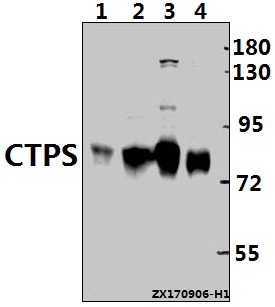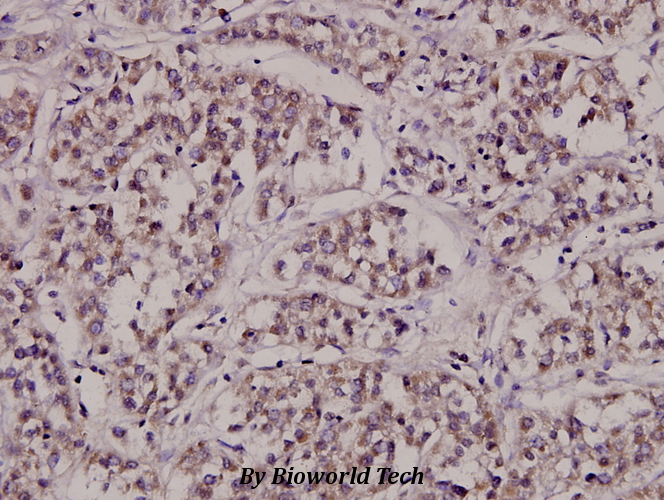Product Name :
CTPS (K109) polyclonal antibody Background :
CTPS (cytidine-5-prime-triphosphate synthase) is a 591 amino acid protein that contains one glutamine amidotransferase type-1 domain and is involved in pyrimidine metabolism. CTPS catalyzes the ATP-dependent conversion of UTP to CTP, a rate-limiting reaction that requires either ammonia or L-glutamine as a nitrogen source. Via its catalytic activity, CTPS plays an important role in the synthesis of nucleic acids and is crucial for proper cell growth and development. The function of CTPS is regulated by a variety of mechanisms, including phosphorylation by protein kinase C (PKC), an event that can either stimulate or inhibit CTPS activity. The gene encoding CTPS is located in a region on chromosome 1 that is often associated with the progression of several tumor types, suggesting a possible role for CTPS in tumorigenesis. Product :
Rabbit IgG, 1mg/ml in PBS with 0.02% sodium azide, 50% glycerol, pH7.2 Storage&Stability :
Store at 4°C short term. Aliquot and store at -20°C long term. Avoid freeze-thaw cycles. Specificity :
CTPS (K109) polyclonal antibody detects endogenous levels of CTPS protein. Immunogen :
Synthetic peptide, corresponding to amino acids 80-130 of Human CTPS. Conjugate :
Unconjugated Modification :
Unmodification
CTPS (K109) polyclonal antibody Background :
CTPS (cytidine-5-prime-triphosphate synthase) is a 591 amino acid protein that contains one glutamine amidotransferase type-1 domain and is involved in pyrimidine metabolism. CTPS catalyzes the ATP-dependent conversion of UTP to CTP, a rate-limiting reaction that requires either ammonia or L-glutamine as a nitrogen source. Via its catalytic activity, CTPS plays an important role in the synthesis of nucleic acids and is crucial for proper cell growth and development. The function of CTPS is regulated by a variety of mechanisms, including phosphorylation by protein kinase C (PKC), an event that can either stimulate or inhibit CTPS activity. The gene encoding CTPS is located in a region on chromosome 1 that is often associated with the progression of several tumor types, suggesting a possible role for CTPS in tumorigenesis. Product :
Rabbit IgG, 1mg/ml in PBS with 0.02% sodium azide, 50% glycerol, pH7.2 Storage&Stability :
Store at 4°C short term. Aliquot and store at -20°C long term. Avoid freeze-thaw cycles. Specificity :
CTPS (K109) polyclonal antibody detects endogenous levels of CTPS protein. Immunogen :
Synthetic peptide, corresponding to amino acids 80-130 of Human CTPS. Conjugate :
Unconjugated Modification :
Unmodification
-
 Western blot (WB) analysis of CTPS (K109) pAb at 1:1000 dilution Lane1:The Kidney tissue lysate of Mouse(40ug) Lane2:The Kidney tissue lysate of Rat(40ug) Lane3:HEK293T whole cell lysate(10ug) Lane4:A549 whole cell lysate(10ug)
Western blot (WB) analysis of CTPS (K109) pAb at 1:1000 dilution Lane1:The Kidney tissue lysate of Mouse(40ug) Lane2:The Kidney tissue lysate of Rat(40ug) Lane3:HEK293T whole cell lysate(10ug) Lane4:A549 whole cell lysate(10ug) -
 Immunohistochemistry (IHC) analyzes of CTPS (K109) pAb in paraffin-embedded liver cancer tissue at 1:100.
Immunohistochemistry (IHC) analyzes of CTPS (K109) pAb in paraffin-embedded liver cancer tissue at 1:100.
Bioworld Biotech only provide peptides for our antibodies and do not provide additional peptide customization services.
Price/Size :
USD 368/1mg/vial
Tips:
For phospho antibody, we provide phospho peptide(0.5mg) and non-phospho peptide(0.5mg).Describe :
Blocking peptides are peptides that bind specifically to the target antibody and block antibody binding. These peptide usually contains the epitope recognized by the antibody. Antibodies bound to the blocking peptide no longer bind to the epitope on the target protein. This mechanism is useful when non-specific binding is an issue, for example, in Western blotting (WB) and Immunohistochemistry (IHC). By comparing the staining from the blocked antibody versus the antibody alone, one can see which staining is specific; Specific binding will be absent from the western blot or IHC performed with the neutralized antibody.Formula:
Synthetic peptide was lyophilized with 100% acetonitrile and is supplied as a powder. Reconstitute with 0.1 ml DI water for a final concentration of 10 mg/ml.The purity is >90%,tested by HPLC and MS.
Storage:
The freeze-dried powder is more stable. For short time at 2-8°C. For long term storage store at -20°C.
Note :
This product is for research use only (RUO only). Not for use in diagnostic or therapeutic procedures.
 CTPS (K109) polyclonal antibody
CTPS (K109) polyclonal antibody  Datasheet
Datasheet COA
COA MSDS
MSDS SHIP
SHIP